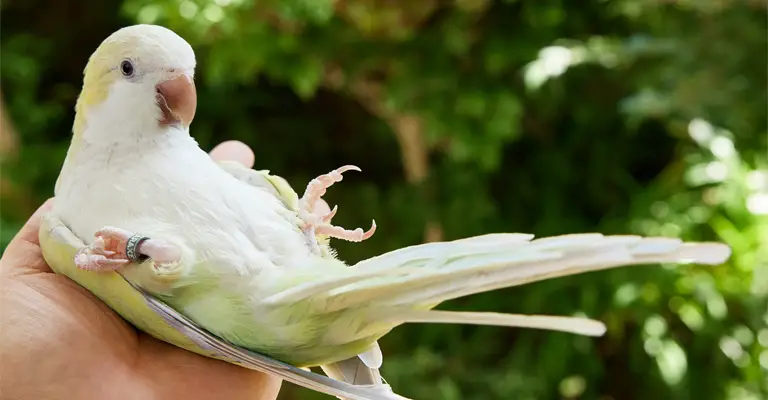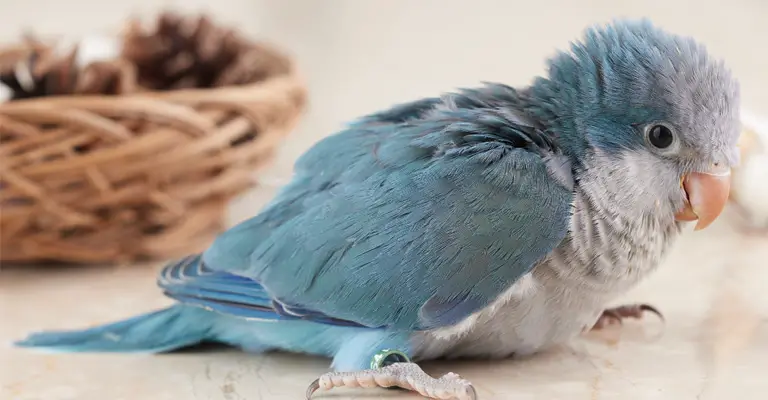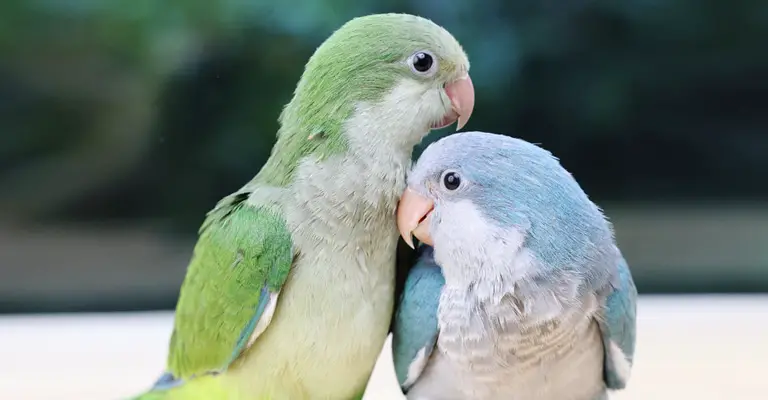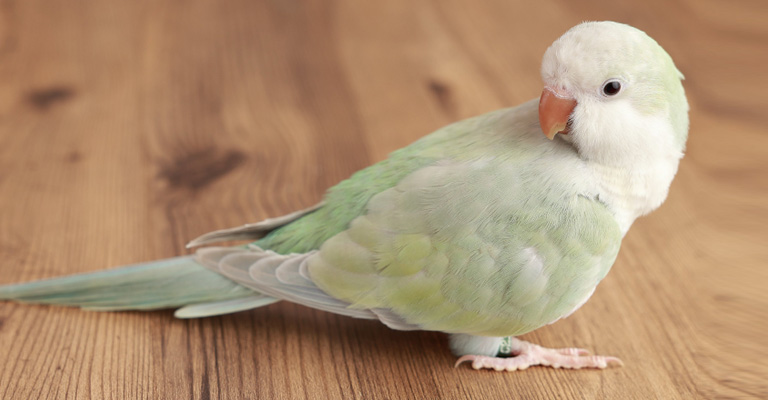Quaker Parrots, also known as Monk Parakeets, are vibrant and intelligent birds that have won the hearts of bird enthusiasts around the world. These small, colorful parrots are not only known for their engaging personalities but also for their remarkable lifespans.
If you’re considering bringing a Quaker Parrot into your home or already have one perched on your shoulder, understanding their potential lifespan is crucial for providing them with the best care and companionship.
In this blog post, we will try to answer the question ‘What Is The Lifespan Of A Quaker Parrot?’. Whether you’re a seasoned Quaker Parrot owner or a curious beginner, we’ll provide insights into how to extend their years of chirping joy and companionship. Stay focused.

What Is The Lifespan Of A Quaker Parrot?
Quaker Parrots, also known as Monk Parakeets, have a relatively long lifespan compared to some other parrot species. On average, they can live for about 20 to 30 years in captivity, although some may reach even older ages with proper care.
Factors such as diet, environment, and healthcare play crucial roles in determining their lifespan. A balanced diet consisting of fresh fruits, vegetables, high-quality pellets, and occasional treats is essential for their well-being.
Providing mental stimulation through toys and social interaction is also important to keep them mentally and emotionally healthy. Additionally, routine veterinary check-ups can help detect and address any health issues early, potentially extending their lifespan.
With the right care and attention, Quaker Parrots can become cherished companions for several decades, making them a popular choice among bird enthusiasts.
Things That Affect the Lifespan of Quaker Parrots
Several factors can significantly affect the lifespan of Quaker Parrots:
Diet
Providing a balanced diet that includes fresh fruits, vegetables, high-quality pellets, and occasional treats is crucial. Poor nutrition can lead to health problems and a shorter lifespan.
Environment
A safe and comfortable living environment is essential. Ensure the cage is spacious, clean, and free from hazards. Proper temperature and lighting are also vital for their well-being.
Social Interaction
Quaker Parrots are highly social birds. Lack of social interaction and mental stimulation can lead to stress and a shorter lifespan. Regular human interaction, playtime, and socializing with other birds can improve their quality of life.
Healthcare
Regular check-ups with an avian veterinarian are essential. Early detection and treatment of illnesses and infections can extend their lifespan.
Exercise
Encouraging physical activity through toys, perches, and opportunities for flight can help maintain their physical health.
Mental Stimulation
Quaker Parrots are intelligent birds that require mental stimulation. Provide toys, puzzles, and activities to prevent boredom.
Hygiene
Maintaining a clean environment, including clean food and water dishes, helps prevent disease and infection.
Toxic Substances
Keep them away from toxic substances such as lead, zinc, and certain household plants, as ingestion can be fatal.
Stress Reduction
Minimize stressors in their environment, such as loud noises or frequent changes in their surroundings.
Breeding
Breeding Quaker Parrots should be done responsibly, as it can be physically taxing on the birds. Repeated breeding without proper care can shorten their lifespan.
By providing a nurturing and stimulating environment, along with proper nutrition and healthcare, you can maximize the lifespan of your Quaker Parrot and ensure they live a long and healthy life.
Balance Diet That Helps Increase their Lifespan

A well-balanced diet is crucial for increasing the lifespan and overall health of Quaker Parrots. Here’s a breakdown of the components that should be included in their diet:
Pellets
High-quality commercial parrot pellets make an excellent base for their diet. Look for pellets formulated for medium-sized parrots, as they provide essential vitamins and minerals.
Fresh Fruits
Offer a variety of fresh fruits like apples, grapes, bananas, oranges, and berries. These provide essential vitamins, especially vitamin C.
Fresh Vegetables
Include vegetables such as broccoli, carrots, spinach, kale, and bell peppers. These offer crucial vitamins and minerals like vitamin A and calcium.
Leafy Greens
Dark, leafy greens like Swiss chard, collard greens, and dandelion greens provide additional nutrients and variety.
Healthy Grains
Occasional servings of cooked grains like brown rice, quinoa, and whole wheat bread can be offered for added nutrition and variety.
Nuts and Seeds
Provide in moderation as a treat, as they are high in fat. Suitable options include almonds, walnuts, and sunflower seeds.
Protein
Offer sources of protein such as cooked eggs and lean, cooked meats (chicken or turkey) in small amounts.
Sprouted Seeds
These are nutrient-rich and can be included as a supplement to their diet.
Cuttlebone and Mineral Blocks
These provide calcium and minerals to help maintain their beak and bone health.
Fresh Water
Ensure access to clean, fresh water at all times.
Remember to wash fruits and vegetables thoroughly to remove any pesticides or residues. Additionally, consult with an avian veterinarian or a bird nutritionist to tailor the diet to your specific Quaker Parrot’s needs, as individual birds may have unique dietary requirements.
Maintaining variety and moderation in their diet is key to ensuring they receive a wide range of nutrients. Avoid feeding them chocolate, avocado, caffeine, alcohol, and high-sugar or high-salt foods, as these can be harmful to their health.
Environment That Helps Increase Quaker Parrots’ Lifespan

Creating the right environment for Quaker Parrots is essential for their well-being and can contribute to a longer, healthier lifespan. Here are key aspects to consider:
Appropriate Cage
Provide a spacious and well-constructed cage that allows for plenty of movement. The cage should be made of safe materials (avoid lead or zinc-coated cages) and have secure locks.
Cage Location
Place the cage in a quiet, well-lit area of your home, away from drafts and direct sunlight. Avoid putting it in a high-traffic area or near noisy appliances.
Cage Accessories
Include perches of various sizes and textures to encourage exercise and foot health. Add toys and items for mental stimulation, like puzzles, swings, and foraging toys.
Safe Flooring
Line the cage floor with safe bedding material, such as newspaper or paper-based bedding. Avoid using cedar or pine shavings, as they can release harmful fumes.
Temperature Control
Maintain a stable temperature between 65°F and 80°F (18°C – 27°C). Quaker Parrots are sensitive to temperature extremes, so avoid drafts and sudden temperature changes.
Humidity
Keep the humidity level between 40% and 60%, as they are tropical birds and require some humidity for respiratory health.
Social Interaction
Quaker Parrots are social birds that thrive on interaction with their owners or other parrots. Spend time with your parrot daily, and consider having more than one bird for companionship if possible.
Regular Exercise
Provide daily opportunities for flight and exercise outside the cage in a safe, bird-proofed room.
Grooming
Offer a shallow dish of water for bathing, or gently mist your parrot with a spray bottle to help it maintain clean feathers.
Routine and Stability
Establish a consistent daily routine for feeding, playtime, and sleep to reduce stress.
Veterinary Care
Schedule regular check-ups with an avian veterinarian to monitor your bird’s health and address any potential issues early.
Diet and Nutrition
Ensure a balanced diet with fresh fruits, vegetables, and high-quality pellets, as mentioned earlier, to support their overall health.
Toxic Hazards
Remove any toxic plants, chemicals, or substances from the vicinity of the cage. Ensure the bird cannot access potential hazards.
By providing a safe, stimulating, and comfortable environment, you can help ensure that your Quaker Parrot lives a longer and healthier life.
Tips to Help Quaker Parrots to Expand Their Lifespan

Expanding the lifespan of Quaker Parrots requires a combination of proper care, attention, and a focus on their physical and mental well-being. Here are some tips to help ensure your Quaker Parrot lives a long and healthy life:
Balanced Diet
Offer a well-rounded diet that includes fresh fruits, vegetables, high-quality pellets, and occasional treats. Ensure that their nutritional needs are met, and consult with an avian veterinarian for dietary advice.
Hydration
Provide clean, fresh water daily. Dehydration can lead to health issues, so make sure they have access to water at all times.
Exercise
Encourage physical activity through toys, swings, and opportunities for flight outside the cage. Regular exercise helps maintain muscle tone and overall health.
Mental Stimulation
Quaker Parrots are intelligent and need mental stimulation. Rotate toys regularly, introduce puzzles, and engage in interactive playtime to prevent boredom.
Social Interaction
Quaker Parrots are social birds and thrive on companionship. Spend time with them daily, talk to them, and consider getting a second bird for social interaction.
Regular Vet Check-ups
Schedule routine check-ups with an avian veterinarian to monitor their health, detect issues early, and ensure they receive necessary vaccinations and treatments.
Environment
Maintain a clean and safe living environment. Regularly clean their cage and remove waste to prevent the buildup of harmful bacteria.
Temperature and Humidity Control
Keep their environment within a stable temperature range (65°F to 80°F) and humidity levels (40% to 60%) to prevent stress and respiratory issues.
Grooming
Offer opportunities for bathing or misting to help them maintain clean feathers and good hygiene.
Avoid Toxins
Ensure that their surroundings are free from toxic substances, including plants, chemicals, and fumes.
Routine and Stability
Establish a consistent daily routine for feeding, playtime, and sleep to reduce stress and anxiety.
Quarantine New Birds
If introducing a new bird to your household, quarantine them for a few weeks to prevent the potential spread of diseases to existing birds.
Training and Positive Reinforcement
Use positive reinforcement training methods to teach your Quaker Parrot basic commands and behaviors. This can help reduce stress and improve their relationship with you.
Monitoring Weight and Behavior
Keep an eye on their weight and behavior. Sudden changes may indicate health issues that require prompt attention.
Provide Chewing Opportunities
Quaker Parrots love to chew. Offer safe materials like wooden toys and branches to satisfy this natural behavior.
By implementing these tips and providing a loving and attentive environment, you can help maximize the lifespan of your Quaker Parrot and ensure they enjoy a happy and healthy life for many years.
FAQs
Quaker Parrots, also known as Monk Parakeets, have an average lifespan of 20 to 30 years in captivity when provided with proper care, nutrition, and a suitable environment.
Yes, Quaker Parrots can potentially live longer than their average lifespan when provided with a balanced diet, social interaction, regular vet check-ups, and a safe, stress-free environment.
Yes, Quaker Parrots in the wild often have a shorter lifespan, typically around 8 to 12 years, due to predation, harsh environmental conditions, and limited access to veterinary care.
Factors such as poor nutrition, exposure to toxins, lack of social interaction, stressful environments, and inadequate healthcare can significantly shorten a Quaker Parrot’s lifespan.
Genetics can play a role in a Quaker Parrot’s lifespan, but proper care and environment have a more substantial impact. Selecting a reputable breeder can help ensure healthier genetics and a longer potential lifespan for your pet Quaker Parrot.
Wrapping Up
In the realm of avian companionship, Quaker Parrots stand out not just for their endearing personalities but also for their impressive lifespans.
With proper care, attention to their physical and mental well-being, and a nurturing environment, these feathered friends can grace your life for two to three decades or even more.
Remember, the journey towards a long and fulfilling life for your Quaker Parrot starts with understanding their needs, providing a balanced diet, creating a safe and engaging environment, and maintaining regular vet check-ups.
By applying these principles, you can ensure that your Quaker Parrot remains a cherished member of your family for years to come. Best of luck.